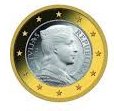Latvia, the 18th member of the eurozone.
1 Jan 2014 Andris Vilks said the recent events in Ukraine, which decided at the last minute to turn down an integration agreement with the EU in favour of closer ties with Russia, demonstrated why the Baltic state of 2m people is joining the euro. “Russia isn’t going to change. We know our neighbour. There was before, and there will be, a lot of unpredictable conditions. It is very important for the countries to stick together, and with the EU,”, added the finance minister. 
Latvia still has close ties with Russia, with about 40 per cent of the bank deposits in the country coming from ex-Soviet states. In the country, which is the 18th member of the euro area, opponents of the currency switch outnumber proponents two-to-one as public expectations for accelerating inflation mount, opinion polls show. Residents are also bracing for taking on new responsibilities in the currency union.
Concern that inflation will accelerate is rising even after consumer prices fell 0.4 percent in November from a year earlier, the sixth month this year without an increase. The Finance Ministry estimates prices will rise 2.3 percent next year as the economy expands 4.2 percent.
“Joining the euro marks the completion of Latvia’s journey back to the political and economic heart of our continent, and that is something for all of us to celebrate,” EU Economic and Monetary Affairs Commissioner Olli Rehn said in a statement.
“Immediately after Latvia joins the eurozone, I imagine we’re going to see an actual spike in dubious money flowing in,” said Mark Galeotti, a professor at New York University who researches organized crime in the former Soviet Union.
For years, Latvia’s political and financial leaders had hoped to create a mini-Switzerland in Eastern Europe — a place where capital in unstable countries such as Russia or Kazakhstan could either park for a while or channel its way further west to banking meccas like Zurich or London.
- In: Euro-Integration
Comment Form
Welcome
We are a group of long experienced European journalists and intellectuals interested in international politics and culture. We would like to exchange our opinion on new Europe and Russia.
Categories
- Breaking News (11)
- CIS (129)
- Climate (2)
- Energy&Economy (115)
- EU Eastern Dimension (85)
- Euro 2012 – Sochi 2014 – World Cup 2018, Sport (43)
- Euro-Integration (135)
- History Culture (198)
- International Policy (261)
- Military (74)
- Interviews (18)
- Italy – Italia – Suisse (47)
- Odd Enough (10)
- Poland and Baltic States (126)
- Religion (31)
- Russia (421)
- Survey (4)
- Turning points (4)
- Ukraine (176)
- Российские страницы (113)
Archives
- November 2020
- October 2020
- September 2020
- August 2020
- July 2020
- May 2020
- April 2020
- March 2020
- January 2020
- December 2019
- November 2019
- October 2019
- September 2019
- August 2019
- July 2019
- June 2019
- May 2019
- April 2019
- March 2019
- February 2019
- December 2018
- November 2018
- October 2018
- September 2018
- August 2018
- July 2018
- June 2018
- May 2018
- April 2018
- March 2018
- February 2018
- January 2018
- December 2017
- November 2017
- October 2017
- September 2017
- August 2017
- July 2017
- May 2017
- March 2017
- January 2017
- December 2016
- November 2016
- October 2016
- September 2016
- July 2016
- June 2016
- May 2016
- April 2016
- February 2016
- January 2016
- November 2015
- October 2015
- September 2015
- June 2015
- April 2015
- March 2015
- February 2015
- January 2015
- December 2014
- November 2014
- October 2014
- September 2014
- August 2014
- July 2014
- June 2014
- May 2014
- April 2014
- March 2014
- February 2014
- January 2014
- December 2013
- November 2013
- October 2013
- September 2013
- August 2013
- July 2013
- June 2013
- May 2013
- April 2013
- March 2013
- February 2013
- January 2013
- December 2012
- November 2012
- October 2012
- September 2012
- August 2012
- July 2012
- June 2012
- May 2012
- April 2012
- March 2012
- February 2012
- January 2012
- December 2011
- November 2011
- October 2011
- September 2011
- August 2011
- July 2011
- June 2011
- May 2011
- April 2011
- March 2011
- February 2011
- January 2011
- December 2010
- November 2010
- October 2010
- September 2010
- August 2010
- July 2010
- June 2010
- May 2010
- April 2010
- March 2010
- February 2010
- January 2010
- December 2009
- November 2009
- October 2009
- September 2009
- August 2009
Our books




